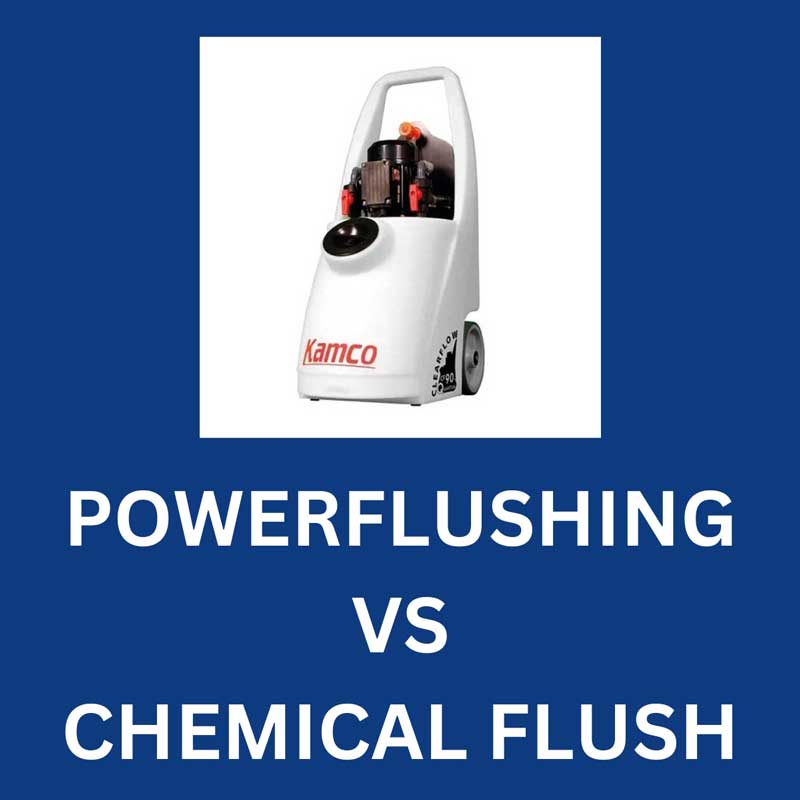
We often get asked what’s the difference between a Powerflush and a Chemical Flush? And which is better? And which should I choose?
We aim to answer the above questions in this article.
Brief Explanation of Central Heating Systems
Understanding the basic operation of central heating systems is the starting point for Power Flushing Vs Chemical Flushing.
Central heating systems operate with a heat source, usually a Boiler, which heats water.
This heated water is then circulated via pipes to radiators installed throughout the property.
Once at the radiators, heat is emitted into the surrounding space warming the room.
Power & Chemical Flushing cleanse and enhance the longevity and efficiency of your heating system.
Importance of Regular Maintenance of Central Heating Systems
Central heating systems require regular maintenance to ensure they run efficiently and have a long lifespan.
Over time, heating systems develop build-ups of sludge and debris that impede water flow.
Sludge is a term used to describe the build-up of unwanted materials within the system’s pipes and radiators.
This build-up consists of iron oxide, rust, and other mineral deposits that form due to the chemical reactions between the heating system’s water, air, and metal components.
Sludge and debris reduce the system’s efficiency, leading to higher energy bills, inadequate heating, and in extreme cases, can damage the boiler.
Regular maintenance, such as Power & Chemical Flushing, helps prevent these issues, ensuring your system remains reliable, efficient and cost-effective.
Both Powerflush and Chemical Flush cleanse central heating systems, but they do so in different ways and come with their own advantages and disadvantages.
Let’s look into both techniques and compare them to help you decide on the best approach for maintaining your central heating system.
Understanding Powerflushing
Powerflushing is a complete cleaning method used for central heating systems.
It involves pumping water and specially formulated cleaning chemicals through the system at pressure.
Powerflushing dislodges and removes sludge, rust, and other debris that may have accumulated in the heating system over time.
The process begins with a heating engineer connecting a powerflushing machine to the heating system.
This machine pumps water and cleaning chemicals into the system. The high pressure of the water helps to dislodge accumulated debris and sludge, which is then extracted and safely disposed of.
The system is then thoroughly rinsed with clean water to remove any remaining traces of the cleaning solution and dislodged debris.
Finally, an inhibitor is added to the system to reduce the likelihood of future corrosion and sludge and debris build-up.
Pros Of Powerflushing
- Improved System Efficiency: By removing blockages, Powerflushing allows water to circulate more freely, thereby improving the overall efficiency of the heating system. This can lead to better heat distribution and faster warming of your home.
- Extended System Lifespan: By cleaning out sludge and debris, Powerflushing reduces wear and tear on the system and potentially extends its lifespan.
- Reduced Energy Bills: An efficient system consumes less energy which can lead to significant savings on your energy bills.
Cons Of Powerflushing
- Cost Implications: Powerflushing is more expensive than chemical flushing because it requires specialised equipment and is performed by a heating engineer.
- Potential for Leaks: If the system is old, the high-pressure water used in Powerflushing can cause leaks in the pipes and joints.
- Requires Professional Help: Powerflushing is not a DIY job and must be conducted by a professional heating engineer.
Understanding Chemical Flushing
Chemical flushing involves using specific cleaning chemicals to dissolve and dislodge debris and sludge within the system.
Unlike Powerflushing, it usually doesn’t involve high-pressure water and is less aggressive on your heating system.
The process typically starts with a heating engineer adding a chemical cleaner to the system and allowing it to circulate.
This cleaner is designed to break down the build-up of sludge, rust, and other deposits that reduce your heating system’s efficiency.
After a set period, the system is drained to remove the cleaner and the loosened debris. Lastly, the system is refilled with water, and a corrosion inhibitor is added to help protect the system from future build-up.
Pros of Chemical Flushing
- Cost-Effective: Chemical flushing is less expensive than Powerflushing, making it a more affordable option for homeowners.
- Can be DIY in Some Instances: Depending on the complexity of your system and the severity of the blockages, chemical flushing can sometimes be performed without needing a professional, unlike Powerflushing.
- Less Intensive on the System: Since it does not use high-pressure water, Chemical Flushing is a gentler option, reducing the risk of leaks in older systems.
Cons Of Chemical Flushing
- May Not Remove Stubborn Blockages: Chemical flushing is less effective than Powerflushing at removing sludge and debris.
- Frequent Flushes May Be Required: Given its less aggressive nature, more frequent flushes may be required to maintain system efficiency.
- Potential for Incorrect Use of Chemicals: If performed as a DIY task, there’s a risk of incorrect use of chemicals which can potentially damage the system or be hazardous. Always follow the manufacturer’s instructions when using chemical cleaners.
Powerflushing Or Chemical Flushing?
Choosing the right cleansing method for your central heating system depends on several factors.
While both Powerflushing and Chemical Flushing aim to remove debris and improve efficiency, certain aspects may make one method more suitable for your specific circumstances.
The Age Of The Central Heating System
Older systems are more likely to have accumulated significant debris and may benefit more from a thorough Powerflush.
However, if the system is particularly old or fragile, the high-pressure water used in Powerflushing could cause leaks and damage, making Chemical Flushing a safer choice.
The Type Of Build-ups In The System
Powerflushing’s high-pressure water can be more effective for heavy, stubborn blockages at dislodging and removing the build-up.
However, a Chemical Flush may be sufficient for lighter deposits or if the system has been regularly maintained.
The Overall Condition of the System
If your system shows signs of significant corrosion or wear and tear, Powerflushing may not only clear blockages but also remove any corrosive elements, potentially extending the system’s life.
Conversely, a system in good condition with minor blockages requires a gentler Chemical Flush.
Cost
Powerflushing is more expensive than Chemical Flushing due to the need for a heating engineer and specialised equipment.
If budget is a key concern, Chemical Flushing might be the more cost-effective choice.
However, it’s essential to consider potential future costs – an inefficient or damaged system may lead to higher energy bills or expensive repairs, making a Powerflush a worthwhile investment.
Need A Powerflush Or Chemical Flush?
TM Hughes & Son Gas Services Ltd provide both Powerflushing and Chemical Flushing throughout Essex.
Please contact us if you live in the county and would like a free, no-obligation quote.

Hi, I’m Terry, the founder and owner of TM Hughes & Son Gas Services
Please get in touch to book an appointment or receive a free, no-obligation quote
Call – 01245 830075
Email – info@tmhughesandson.uk
0% Finance
For Boiler Installations & Repair
